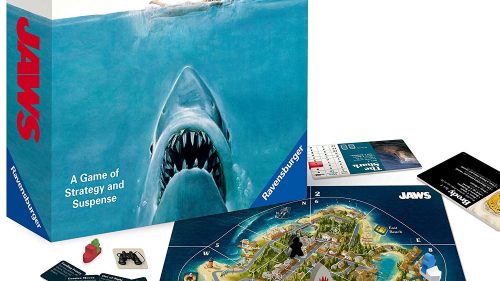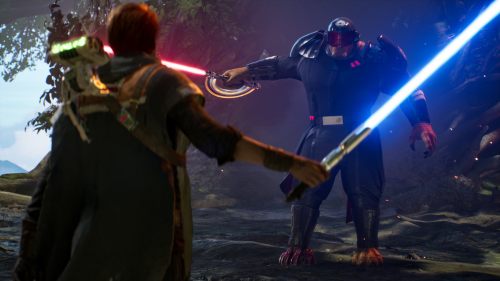SPLATOON 2 Game Review: Nintendo’s Gooey Kablooie
You know a game's good when it’s fun just messing around with the core mechanic. Splatoon 2 is one of these games: a multiplayer shooter, now with a single-player component, whose central mechanic is so ingenious and so much fun that it’s enjoyable even outside matches.
For those unfamiliar with Nintendo’s newest and biggest IP, or like me, only barely familiar due to having not owned a Nintendo console, Splatoon is a team-based shooter all about ink and marine animals. Players take on the roles of teenage were-squid of sorts: lanky gun-toting athletes with the ability to transform into swimming tentacled creatures. Their weapons fire not bullets but coloured ink: their own team’s colour refills their ink canisters and grants extra speed in squid form, while the other team’s colour damages and slows. Everything in the game comes from that ink mechanic. It’s remarkably clever.
There’s something uniquely and strangely satisfying about Splatoon 2’s game-feel - its textures, its sound effects, its particular flavour of responsiveness. Sloshing through an ink-soaked battlefield is a delightful, visceral, messy, physical thing, like playing in the mud as a child, and the weapons - from paintball-style repeaters to rollers, brushes, and buckets - are a joy to use (if somewhat unbalanced at this stage). And yet, that messy design is also incredibly clean, functionally speaking - the basic and best match type revolves around ink coverage, so the distinctive primary-colour look works wonders (including for the colourblind, hooray).
Multiplayer matches in Splatoon 2 are super fast but also super tactical. It’s all about territory, so running out in search of opponents to splat isn’t the best strategy. Splatoon 2 is terrific for those compelled to colour in the letters in textbooks, or those who doodle intricate patterns until they become solid blocks of colour. You can absolutely contribute to matches just by painting the map, although it certainly doesn’t hurt to take down an opponent and slow their progress. There’s little more satisfying than flanking an enemy via your team's ink before splatting them and taking back their territory. For deeper tactics, the in-game map, secondary weapon functions, and environmental gameplay objects are all there, as is a daunting range of upgrades and cosmetic items, but the core game is beautifully simple and moreish.
For those times when a match can’t be made, Nintendo has also included a surprisingly generous single-player offering. Spanning 32 levels across five increasingly-complex overworlds, the campaign feels like a Nintendo platformer adapted to a third-person shooter format. Each level introduces a new weapon, enemy type, or platforming concept, while boss battles put their particular world's concepts to the test. Designed around replayability, the game tracks completion time, scores, and collectibles, as well as the weapons you've completed levels with. Granted, the single-player is still something of a training simulation for multiplayer (each world includes one level taking place on a multiplayer map with simulated AI enemies), but it’s more full-featured and challenging than one would expect from an online-focused shooter. Just don’t expect any great narrative development: the squid-vs-octopus storyline is thin connective tissue at best.
Splatoon 2 also includes a secondary, cooperative multiplayer mode called Salmon Run that’s simultaneously its best feature and one of its most puzzling decisions. Salmon Run is a horde-type mode for up to four players, tasking participants with fending off waves of enemies while collecting and banking pickups from fallen bosses. Like its counterpart modes in Gears of War, Halo, and other games, Salmon Run is more fun than the competitve multiplayer, offering a frenetic (if more visually drab) cooperative experience with an range of amusingly-designed enemies to fight. But Nintendo only offers this mode for local multiplayer (system-to-system only; no split-screen), with online play only activating at certain times. Maybe Nintendo simply wants to shunt people towards the more e-sports friendly Regular, Ranked, and League matches, but damn it, they just aren’t as good.
That decision isn’t nearly as baffling as Splatoon 2's take on voice chat. Granted, it’s an issue with the Switch console, rather than with the game, but Splatoon 2 handles chat through a fucking app on your mobile phone. That’s inconvenient at best, but if you want to play with headphones, it practically mandates the purchase of a cumbersome audio interface. Given the amount of strategy and communication required, particularly in ranked and league play, it’s a terrible design decision that will have echoes across the Switch’s entire multiplayer slate.
Those unfortunate choices are leavened somewhat, however, by an overall presentation that oozes with charm. The fluid simulation is as splattery as the title would suggest. The hub world is so packed with details - like player-created artwork, storefronts, and even a fully-featured rhythm minigame using the game's great soundtrack - that it runs at half the frame rate as the actual gameplay. While matchmaking, you can press the Switch’s face buttons or move the sticks to create simple live remixes of the loading-screen music - a simple addition that makes matchmaking waits more bearable. And the in-game text is so dense with aquatic puns that it crosses back over the line to become adorable, just for how hard it's trying.
I didn’t play the first Splatoon, so I can’t speak to the most common complaint laid against this title - namely that it doesn’t add enough to warrant being called a full numbered sequel. But taken on its own, Splatoon 2 is a rare beast: a non-violent shooter that doesn’t feel compromised by bloodlessness, and a Nintendo game that feels vital and of-the-moment in 2017. It’s addictive and fun, and different enough to the rest of the genre to feel fresh. And all of that aside, swimming around in that damned ink is such a squelchy good time I almost feel guilty for enjoying it so much. Splatoon 2 is the straight-edge punk of the shooter world, and I love it.



